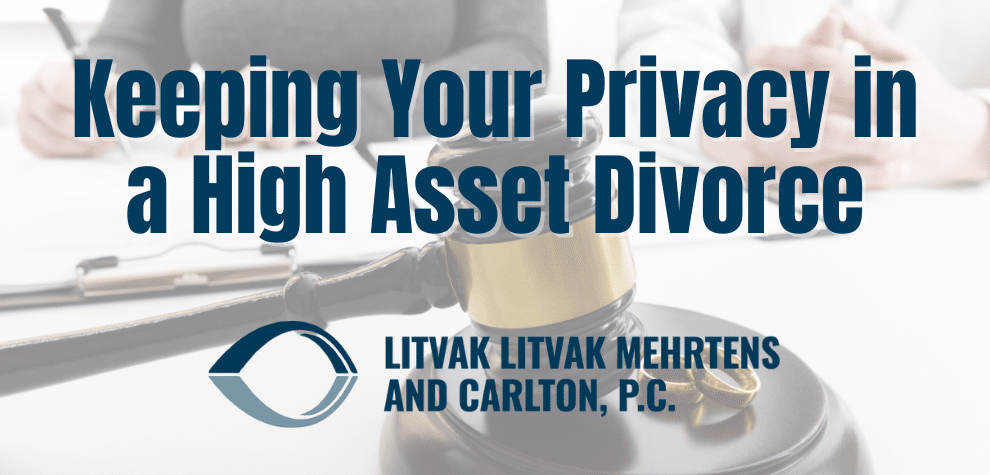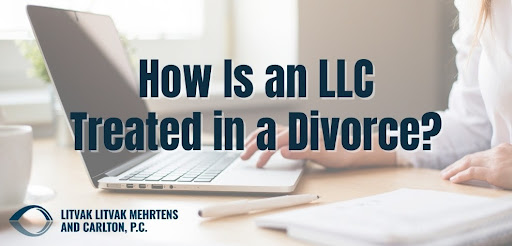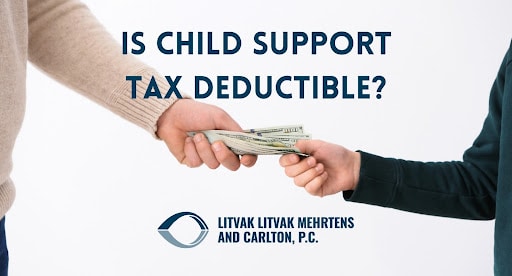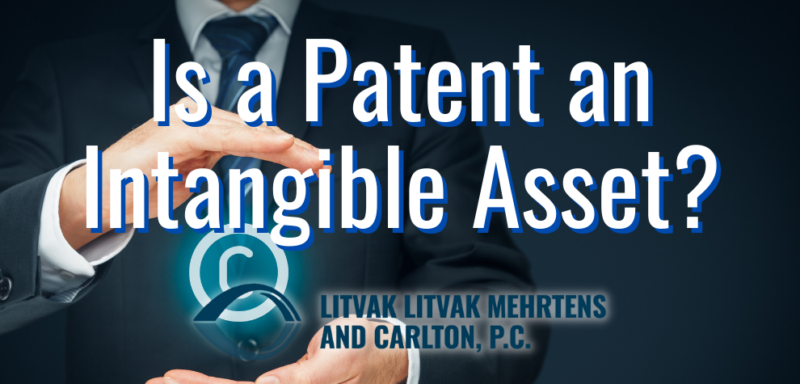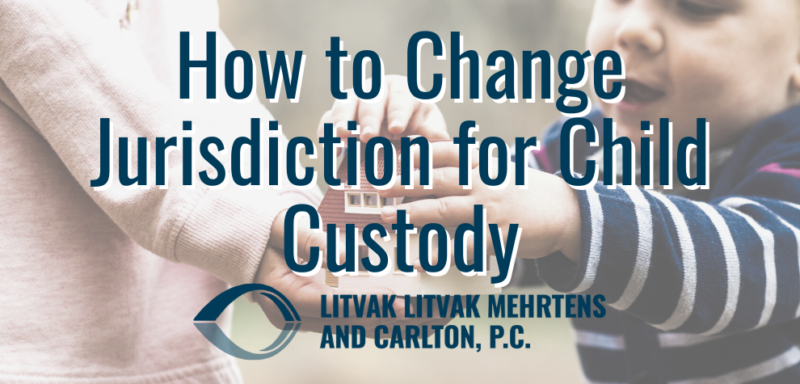No one but you, your soon-to-be-ex spouse, and your respective attorneys should know about your divorce, no matter how messy it becomes. You may keep your divorce a secret until you decide you want others to know. This is, of course, if you take the proper measures and complete the necessary steps. Keeping the legal procedure secret can help your family avoid unneeded stress, safeguard your reputation in the community, and give you control over how and when your children learn about it. Read on for advice on how to have a private divorce in Colorado.
At Litvak Litvak Mehrtens and Carlton P.C., we understand that you don’t want your private business out in the open for all to see. That’s why, with the help of a Denver divorce attorney, you can have a private divorce that safeguards your personal matters. Our firm prioritizes your needs by exercising professionalism in all things. For more information on how we can help your private divorce, please call our Denver office at 303-951-4506 today. We’re happy to arrange a consultation with you.
How Can I Have a Private Divorce in Colorado?
Multiple ways exist to achieve a private divorce in Denver. With the help of an experienced Denver divorce lawyer, you can rest assured that your privacy remains in your hands. Below, we list some steps to take with your lawyer to preserve the privacy of your divorce case.
Only Speak With Professionals
If you want to keep your marital difficulties or divorce choice private, don’t discuss them in public. Don’t bring up the subject of divorce in front of children, strangers, or fellow employees — anybody who could spread the word. Select a small group of trusted confidants to speak with, such as friends and family members who will not discuss the situation with others until you’re ready to go public.
Keeping your divorce private doesn’t have to mean keeping your feelings hidden. Only speak to paid specialists about what’s going on if you want a genuinely private divorce. Consult a skilled therapist about what you’re going through, and speak with your attorney about the legal aspects of your divorce. It is possible to keep your divorce case entirely secret by only speaking with specialists.
Therapists, physicians, attorneys, and other professionals who work with you have a legal duty to keep your information confidential. When you become a patient or customer, you have the benefit of privacy. You don’t have to be concerned about your therapist or lawyer informing others about your divorce. If this happens, you have the legal right to sue the expert for damages for breach of contract.
Maintain Normal Routines
People may also learn about your divorce if they notice changes in your life. For example, your spouse moving out of the house might start a rumor in the neighborhood about your plan to end your marriage. Maintain your normal habits at home and at work if you desire a quiet divorce.
If you have children, sticking to a schedule is even more crucial if you don’t want them to learn about the divorce right away. Continue living in the same house as your spouse, even if you sleep in different rooms or beds. So that no one detects an imminent divorce, go to work as usual, continue trading parenting responsibilities, attend parent-teacher conferences together, and so on.
Settle Without Going to Trial
The smoothest, quietest divorces are uncontested divorces in which the parties come together and negotiate on the conditions of the settlement during mediation. Only the parties involved and the third-party mediator are aware of the situation in these divorce situations. However, if you and your spouse are unable to reach an agreement on the terms of your divorce on your own, your case will have to go to trial. Trials in family court are open to the public, and court reporters are permitted. For optimum privacy, try to resolve your divorce dispute during mediation.
Sign a Confidentiality Clause
Request that a confidentiality clause be included to your formal divorce papers throughout the legal procedures. These can assist you in achieving a higher level of confidentiality than a regular legal case. It can, for example, prevent your spouse from discussing the divorce with anybody else, including friends and relatives. If your spouse breaks a confidentiality agreement, you may be entitled to punitive penalties. Confidentiality provisions can ensure that sensitive facts don’t leave the courts in particularly contentious divorces.
Hire a Private Judge
Private judges are becoming more popular among many people as a way to handle divorces more quickly and discreetly than the regular method. Is this, however, something you can take advantage of if you don’t have connections? Yes, Colorado allows for the hiring of private judges to hear and decide on a range of issues, including divorce. It is a highly popular option for those wanting a more private divorce.
What Is a Private Judge?
Hiring a private judge to hear the case is a little-known method for having a divorce handled swiftly. A retired judge or a neutral lawyer can serve as a private judge. To use this approach, all parties must agree, and your attorney must be the one who hires the private judge.
It’s vital to understand that being a private judge is not for everyone. These individuals must follow the same legal procedures and ethics as public judges, and they have significant legal knowledge. Private judges must be members of your state’s bar since they are former judges or impartial attorneys.
Who Can Hire a Private Judge?
This may appear to be a luxury only the wealthy can afford, but because both parties share the expense of the private judge’s costs, it may really be more cost effective. Because fees vary based on who you retain and for how long, it’s ideal to have a few alternatives when pitching the idea to your spouse and his or her lawyer.
Why Should I Hire a Private Judge?
One advantage of hiring a private judge is that your case will be heard sooner than it would be in public court. Rather than waiting for the court to schedule your case and then requiring you to attend (on a day that may be inconvenient for you, your attorney, or the opposing party), you can choose which day(s) your case will be heard. This gives both parties more flexibility because they no longer abide by the court’s schedule.
Another wonderful advantage of hiring a private judge is that you may choose who will hear your case. Granted, you’ll need your spouse’s and their attorney’s permission. However, having control over who decides the outcome of your divorce may be reassuring. It also makes an otherwise stressful situation less so.
If you value your privacy, hiring a private judge may be the best option. The court records remain open to the public, but the hearing is not open to the media and the general public. This is because a case before a public judge would be heard in an open courtroom, which means that anybody may stroll in and observe your hearing. Using a private judge keeps your case under the radar and out of the public light.
Contact Litvak Litvak Mehrtens and Carlton P.C. Today
To explore your options for a private divorce, the best course of action involves hiring an experienced Denver family attorney. The highly trained attorneys at Litvak Litvak Mehrtens and Carlton have extensive experience in nearly every aspect of family law. No matter how simple or complicated your case, we’ll put you in the best position for a favorable outcome. To schedule a consultation with an attorney, please call 303-951-4506 today.

